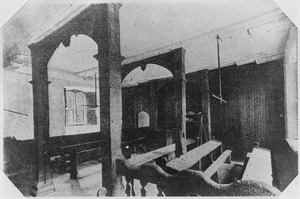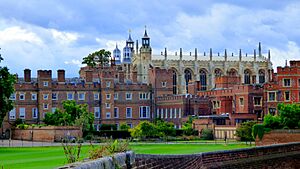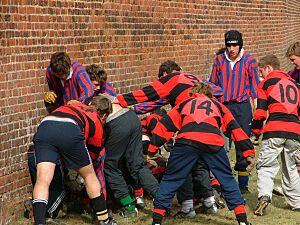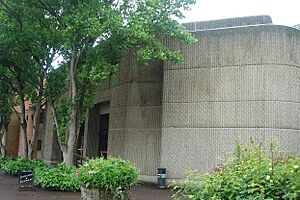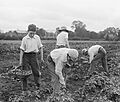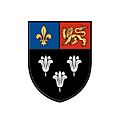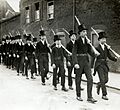Eton College facts for kids
Quick facts for kids Eton College |
|
|---|---|
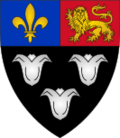 |
|
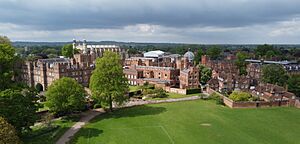
An aerial view of Eton College from the north
|
|
| Location | |
|
Eton, Berkshire, England
,
SL4 6DW
|
|
| Coordinates | 51°29′31″N 0°36′29″W / 51.492°N 0.608°W |
| Information | |
| Type | Boys Public school Private boarding school |
| Motto | Latin: Floreat Etona (May Eton Flourish) |
| Religious affiliation(s) | Church of England |
| Established | 1440 |
| Founder | Henry VI |
| Local authority | Windsor and Maidenhead |
| Department for Education URN | 110158 Tables |
| Provost | Sir Nicholas Coleridge |
| Head Master | Simon Henderson |
| Gender | Boys |
| Age range | 13–18 |
| Enrolment | 1,341 (2024) |
| Capacity | 1,390 |
| Student to teacher ratio | 8:1 |
| Houses | 25 |
| Colour(s) | Eton blue |
| Song | Carmen Etonense |
| Publication | The Chronicle |
| School fees | £ 63,298.80 per year |
| Alumni | Old Etonians |
| Campus | 1,600-acre (6.5 km2) semi-rural campus |
| Affiliations | G30 Schools HMC The Rugby Group |
| Website | Eton College |
| Charity Commission. Eton College, registered charity no. 1139086. https://apps.charitycommission.gov.uk/Showcharity/RegisterOfCharities/SearchResultHandler.aspx?RegisteredCharityNumber=1139086. | |
Eton College is a famous private boarding school for boys aged 13 to 18. It is located in the town of Eton, near Windsor in England. In the UK, schools like Eton are called public schools, which means they are private and charge fees.
The school was founded in 1440 by King Henry VI. It is one of the most famous schools in the world. Many important people have studied there, including 20 British prime ministers, world leaders, and famous actors. Former students are known as Old Etonians.
Eton is one of the few all-boys, all-boarding schools left in the UK. This means all students live at the school during term time. It is known for its long history, traditions, and successful students.
Contents
History of Eton College
How the School Began
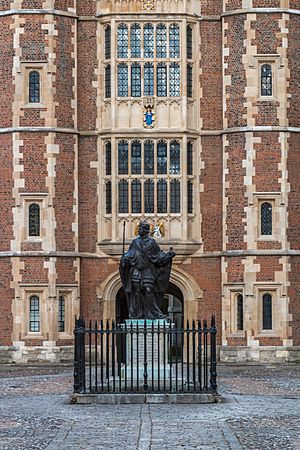
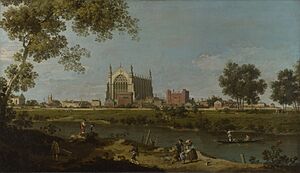
Eton College was founded by King Henry VI in 1440. He wanted it to be a charity school offering free education to 70 poor boys. These boys would then go on to study at King's College, Cambridge, which the king also founded.
King Henry wanted Eton to have amazing buildings. He planned for the College Chapel to have the longest nave (the main part of a church) in Europe. He also gave the school many valuable gifts and land.
However, in 1461, King Henry VI was removed from the throne by King Edward IV. The new king took away most of Eton's money and treasures. A legend says that Edward IV's friend, Jane Shore, convinced him not to close the school completely. The school survived but with much less money. The chapel was never finished to its original size, but it is still a beautiful building.
Over the years, wealthy people donated money to help the school grow. Around 1517, a man named Roger Lupton helped build the famous main gatehouse, which is one of the most recognised images of the school today.
Later History
The famous general, the Duke of Wellington, went to Eton. He is often quoted as saying, "The Battle of Waterloo was won on the playing-fields of Eton." What he probably meant was that the skills and character boys learned from sports helped them become good soldiers.
In the 19th century, new buildings were added to give students better places to live. Before this, many boys lived together in one long room in poor conditions.
Towards the end of the 19th century, Eton started the "Eton Mission". This was a project to help people in poorer parts of London. Students and former students raised money and helped run a church and boys' clubs in Hackney Wick.
Many former Eton students fought in the First World War and Second World War. There are memorials in the chapel and cloisters to remember those who died. During World War II, a bomb damaged part of the school, and many chapel windows were broken. They were later replaced with beautiful modern stained glass.
School Life and Traditions
The House System
Eton has 25 boarding houses. Each house is home to about 50 boys and is run by a teacher called a housemaster. Students spend a lot of time in their houses, and there are many competitions between them in sports and other activities.
King's Scholars
Seventy students at Eton are called King's Scholars. They earn their place by passing a difficult exam before they join the school. These boys live together in a special house called "College."
King's Scholars wear a black gown over their uniform, which earns them the nickname "tugs." They are often among the most academic students in the school.
Oppidans
All other students at Eton are called Oppidans. The name comes from the Latin word oppidum, which means "town." In the past, these students paid fees and lived in the town of Eton, outside the original school buildings.
Today, Oppidans live in the other 24 houses. A student who does very well in exams can earn the title of Oppidan Scholar.
School Uniform
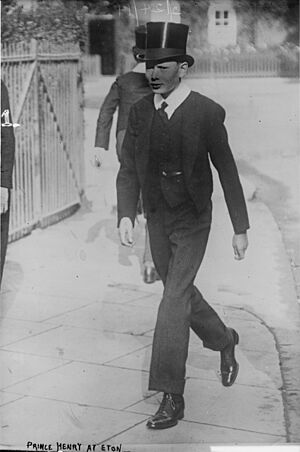
Eton is famous for its uniform. Boys wear a black tailcoat, a black waistcoat, and pinstriped trousers. They also wear a white stiff collar with a narrow white tie.
Some senior boys and prefects get to wear a white bow tie with a winged collar. This is known as "Stick-Ups." There is a myth that the uniform was first worn to mourn the death of King George III in 1820, but this is not true. The uniform became standard in the late 19th century.
Tutors and Teaching
Teachers at Eton are called "Masters" or "beaks." The class sizes are small, with about eight students for every teacher. This means students get a lot of individual attention.
The school day includes a 75-minute period called "Quiet Hour" in the evening. During this time, boys are expected to study or do their homework in their rooms.
All students now use laptops and iPads for their schoolwork. The school has a modern network that connects all classrooms and bedrooms to the internet.
School Rules and Rewards
Eton has a system of rewards and punishments to encourage good work and behaviour.
- Show Up: A reward for an excellent piece of work. The student shows it to their tutors.
- Sent Up For Good: A special honour for an outstanding piece of work. The work is kept forever in the College Archives.
- Rip: Given for poor-quality work. The student must get it signed by their housemaster.
- On the Bill: For more serious problems, a student is "put on the Bill." This means they are called to see the Head Master to discuss what they did wrong.
Prefects
Senior students, known as prefects, help the teachers run the school. There are three main groups of prefects:
- Pop: This is the most well-known group of prefects. Members are chosen for being popular, confident, and respected. They wear special waistcoats and checked trousers. William, Prince of Wales and actors like Eddie Redmayne and Tom Hiddleston were in Pop.
- Sixth Form Select: This group is made up of the top academic students in the final year. They have special duties, like giving speeches at school events.
- House Captains: Each of the 25 houses has one or two captains. They are leaders within their house.
Activities Outside the Classroom
Sports
Sport is very important at Eton. The school has huge playing fields.
- In the autumn, boys play football and rugby union.
- In the spring, they play the Eton Field Game, a type of football unique to Eton. They also play field hockey.
- In the summer, boys can choose to be "dry bobs" (who play cricket and tennis) or "wet bobs" (who row on the River Thames).
Eton has its own Olympic-standard rowing lake, called Dorney Lake. It was used for the rowing and canoeing events at the 2012 Summer Olympics in London.
A famous tradition is the annual cricket match against Harrow School, which has been played at Lord's Cricket Ground since 1805.
Music and Drama
Eton has a very strong music department. There are choirs, orchestras, jazz bands, and rock bands. The main choir often sings in the beautiful College Chapel and tours other countries.
Drama is also very popular. The school has a main theatre and two smaller studio theatres. Many plays are put on each year, including productions run entirely by the students. Famous actors like Damian Lewis, Dominic West, and Eddie Redmayne are former Eton students.
Celebrations
The school's biggest celebration is the "Fourth of June." It celebrates the birthday of King George III, who was a great supporter of Eton. The day includes a "Procession of Boats," where rowing crews row past in old-fashioned wooden boats. Families come for picnics, concerts, and speeches.
Another tradition is St. Andrew's Day, when the famous Eton wall game is played.
Images for kids
- Eton and Castle, the electoral ward that includes the College
- Eton Boating Song
- Eton College Collections
- Eton mess
- Eton Montem
- Eton Racing Boats
- "The Eton Rifles", a 1979 song by the Jam
- Eton Summer Course
- List of head masters of Eton College
- List of the oldest schools in the United Kingdom
- List of the oldest schools in the world
See also
 In Spanish: Eton College para niños
In Spanish: Eton College para niños
 | Madam C. J. Walker |
 | Janet Emerson Bashen |
 | Annie Turnbo Malone |
 | Maggie L. Walker |


